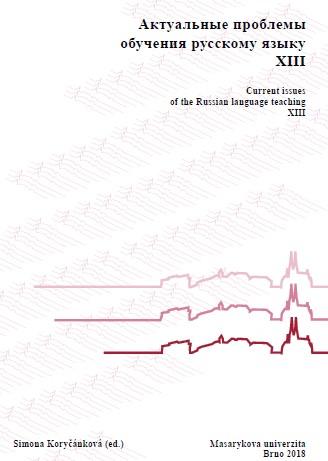ОБРАЗ РОССИИ И РУССКИХ В УЧЕБНИКАХ РУССКОГО КАК ИНОСТРАННОГО, ИЗДАННЫХ В ЧЕХИИ
THE CONCEPT OF RUSSIA AND RUSSIANS IN THE RUSSIAN LANGUAGE TEXTBOOKS PUBLISHED IN THE CZECH REPUBLIC
Author(s): Varvara Golovatina
Subject(s): Foreign languages learning, Eastern Slavic Languages, Sociology of Culture, Pedagogy
Published by: Masarykova univerzita nakladatelství
Keywords: concept; Russian Language Teaching and Learning; Russia; Russian culture; Russians; textbook;
Summary/Abstract: In the second language teaching, first of all, Russian language teaching and learning, one of the main sources of cultural information and information about country are the textbooks. The aim of this study is to identify and describe the concepts of Russia, Russian culture and Russians as presented in the textbooks of Russian as a foreign language recently published in the Czech Republic. It will help to formulate an idea of Russia, Russian culture and Russians formed in the Czech students’ minds at the lessons. Written texts and audio, texts of grammatical and lexical exercises that contain geografical and cultural information about Russia and the Russian culture form the data for the study. Three Russian language textbook sets “Радуга по-новому” (Fraus, 2007-2010 ), “Učebnice součastné ruštiny, 1. díl” (Computer press, 2009) и “Класс!” (Klett, 2010-2011) have been used for the present study. The study employs the methodology of conceptual analysis of the texts developed by N. D. Arutyunova, L. G. Babenko, S. E. Nikitina, and E. V. Rakhilina among the other scholars. In particular, we have analysed contexts of the key words that represent the concepts (Россия, Российская федерация, русский, россиянин, российский, etc.), as well as words expressing different geografical objects, realities of Russian culture (Москва, Санкт-Петербург, Волга, матрешка, etc.), names of cultural and historical figures. A thematic analysis of texts was made to describe the volume of country and cultural information. The results of the study can be valuable for Russian language teachers, authors and editors of textbooks and teaching materials, philologists, specialists in the cognitive linguistics, culture studies, anthropology and other human studies.
Book: Актуальные проблемы обучения русскому языку XIII
- Page Range: 82-91
- Page Count: 10
- Publication Year: 2018
- Language: Russian
- Content File-PDF

